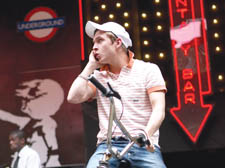|
|
 |
| |
Life on the frontline
THE FRONTLINE
Shakespeare's Globe
WHAT is it about Camden Town that lingers in the memory? Is it the drug dealers and the addicts, that implacable sense of menace, or the raucous nightlife? Perhaps it’s the hot dogs. The chances are that whatever it is, it will not be fit for polite society.
It’s a little strange, then, to see Camden’s grisly carnival presented under the scrutinising lights and ornate eaves of Shakespeare’s Globe for Ché Walker’s new play, The Frontline.
Walker, who hails from Somers Town and finds his artistic inspiration on those streets, has brought to life the whole menagerie of “desperate invisibles”: strippers strut their stuff, hoodies whisper “hash-and-weed”, the converted preach, junkies stagger (a “crack dance” is a highlight), transsexuals screech, madmen prance, mothers search for lost sons.
God only knows what the Globe ushers, each reared on 200 or more years of Troilus and Cressida sandwiches, must make of it all.
If Frontline looks like a mess, that’s because it is: “vast, neon, urine and hypodermic”, in the words of its sometime narrator, John Stahl’s hot-dog seller savant.
Disparate voices flicker over and across each other, often losing sense in the conflagration.
Eventually, though, things settle and a plot begins to emerge.
Miruts (Beru Tessema), the dealer son of an Ethiopian philosophy professor reduced to driving minicabs on harsher, foreign soil, steals a drug delivery belonging to the gangster kingpin, Cockburn (Robert Gwilym).
Fellow dealers beg him to return it, but Miruts is too absorbed in the high life, and a pretty Tube engineer, to pay them heed.
In tandem, a tentative romance blossoms between a stripper and her bouncer (a well-handled duet by Jo Martin and Mo Sesay).
Desperate amateur dramatist Moredechai tries in vain to persuade the press to review his one-man Walter Sickert play, and a tragic old man looks for his daughter in every face.
The 30-strong cast work hard to evoke the grit of Camden; ironically, it may be those very efforts that pull the play up short. A few of the so-called gangsters are prone to lofty histrionics and, on occasion, may explain the etymology of their rhyming slang.
Olly Fox’s ska-tinged songs veer between the good, the self-consciously anthemic, and the criminal. I’ll leave you to pick a box for the bongo-backed political rap number.
The audience at the matinée performance I attended was almost entirely comprised of French and Italian adolescents. They have all seen the Camden of The Frontline because, for all Walker’s ambition and ground-level research, the play never quite breaks the old caricatures or sustains the warts an’ all realism it promises.
Frontline is still an exciting place, but it might be another one of those Camden things that only the tourists buy.
In rep, until August 17
020 7401 9919 |

|
 |
|
|
 |
|



